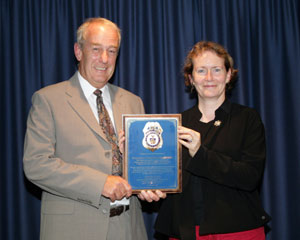Building on 30 year’s investigative experience in the Dorset Police, an ex-Detective Superintendent currently working for Cefas (the Centre for Environment, Fisheries & Aquaculture Science) didn’t know how much his experience in the CID would be appreciated in the world of international marine enquiries.
But the recent presentation of a plaque from the USA to Fish Health Inspector Steve Maidment shows just how valuable those skills have been for cross-government co-operation.

After retiring from the police Steve took up his post at Cefas in 1997, to provide a much-needed investigative role for the Fish Health Inspectorate (FHI) based at Weymouth, Dorset. His duties included under-cover operations to crack down on illegal importation and other transgressions related to fish health in England and Wales.
Steve and the FHI made inquiries in the UK on behalf of the National Oceanic & Atmospheric Administration (NOAA), based in California, USA.
The case, which lasted nearly two years, involved 200 California leopard sharks that were imported via Heathrow airport between 2000 and 2005. Once legally imported, the sharks were legitimately sold on to various aquaria around Great Britain.
Unfortunately, the sharks had been caught in San Francisco Bay and sold on while less than 36 inches long. Removing them from their natural habitat at that size is an offence under Californian State legislation.
Steve’s work on the operation helped to build a strong case against the criminal defendants. They were sentenced to imprisonment and given substantial financial restitution orders in California earlier this year.
Donald Masters, Special Agent in Charge of NOAA in California, commented: “Inspector Maidment distinguished himself as a very thorough and diligent investigator during his work on this case. He has been instrumental in overcoming this worldwide conspiracy. The tenacity and perseverance he demonstrated in conducting his investigation are hallmarks of his professionalism. His support and assistance in the protection of marine resources has enhanced the United States Federal Government’s efforts to manage our nation’s marine resources.”
US Attorney Kevin V. Ryan stated: “As a result of this local and international investigation, $1.5 million has been designated, by restitution and donation, to the restoration of wildlife habitat in the San Francisco Bay. The prosecution … has enabled federal and state authorities to devise means to further protect the California leopard shark.”
Helen Ghosh, Defra’s Permanent Secretary, presented an impressive blue and gold plaque to Steve Maidment recently at the Cefas laboratory in Weymouth.
Steve said: “I’m particularly pleased that the money, $1 million from the offenders alone, will be used to such good effect. It’s gratifying to see that our work here in the UK can have such a wide impact. But I must say, I was stunned by all the fuss about my role in the operation. After all, it’s what we do here: it’s our job. But I am pleased and proud to receive the citation on behalf of my colleagues in the Inspectorate, who were also involved.”
Steve is due for retirement from Cefas in spring 2008, however the FHI will continue to ensure fish health regulations and legislation are properly enforced. Those interested in the work of the FHI should visit www.cefas.co.uk/fhi or contact Cefas directly.
Notes:
1. Cefas is an internationally renowned scientific research and advisory establishment, based at Lowestoft since 1902. It also has laboratories at Burnham-on-Crouch and Weymouth, and a number of other facilities around the UK. It became an executive agency of the Department for Environment, Food and Rural Affairs (Defra) in 1997.
2. The Fish Health Inspectorate (FHI), based at Cefas’ Weymouth laboratory, is dedicated to maintaining and improving fish and shellfish health in England and Wales. Its primary role is to act for Defra and the National Assembly for Wales, Agriculture Department (NAWAD) in undertaking statutory and inspection duties resulting from the EU Fish Health regime and other national legislation in the area of fish and shellfish health.
3. The Inspectorate is also responsible for health certification of fish and shellfish movements from other countries and runs an enforcement programme aimed at preventing the illegal importation of these animals. For more about movement controls and enforcement visit www.cefas.co.uk/fhi/movements.htm.
more … /
4. California leopard sharks are a species of shark within the Triakidae family. Juveniles are commonly found in bays and estuaries from the California/Oregon border south to Baja, Mexico. Major pupping areas, where young California leopard sharks are born, are found within San Francisco and Monterey Bays as well as the southern California coast. Pups are born live and are approximately 10 inches in length.
5. In January 1994, California leopard sharks were afforded extra protection under California State law when the California Department of Fish & Game Code placed a minimum size limit of 36 inches for any commercial take of the species within California jurisdiction. This size limit was implemented because the California leopard shark is a slow-growing species, which does not reach sexual maturity until it is between 7 to 13 years of age. The species may live as long as 30 years. Because of these factors, California State wildlife authorities have established these management measures to ensure the species’ ability to maintain healthy stocks in the wild.
6. US press releases and a UK news item relating to the California leopard shark operation may be found at:
http://www.usdoj.gov/usao/can/press/2006/2006_02_08_leopardshark.htm
http://www.usdoj.gov/usao/can/press/2007/2007_01_23_Thompson.sentencing.press.html
http://www.usdoj.gov/usao/can/press/2007/2007_02_12_leopardsharks.sentencing.press.html
http://news.independent.co.uk/uk/crime/article2035190.ece






